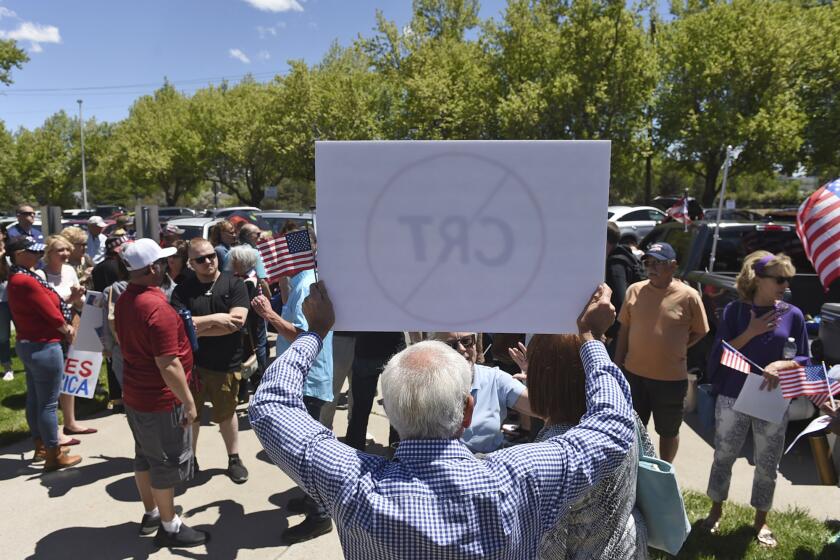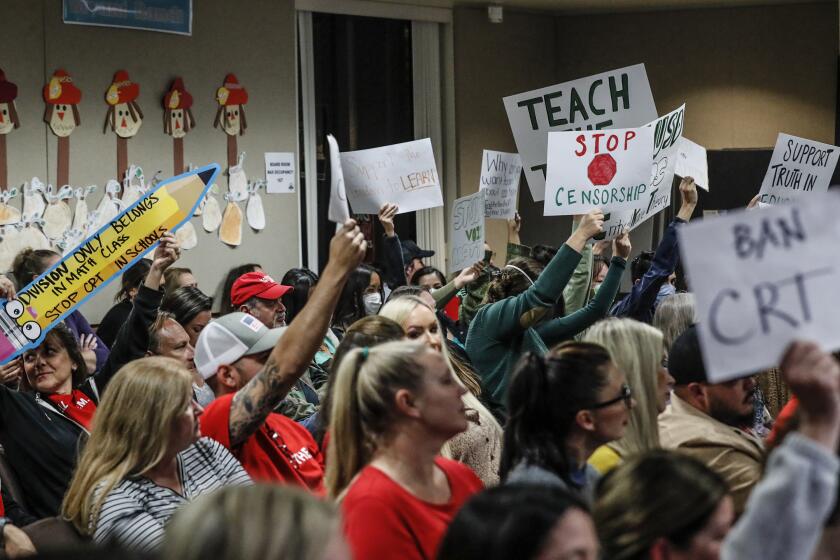High school teacher and students sue over Arkansas’ ban on critical race theory

- Share via
LITTLE ROCK, Ark. — A high school teacher and two students sued Arkansas on Monday over the state’s ban on critical race theory and “indoctrination” in public schools, asking a federal judge to strike down the restrictions as unconstitutional.
The lawsuit by the teacher and students from Little Rock Central High School, site of the historic 1957 racial desegregation crisis, stems from the state’s decision last year that an Advanced Placement course on African American studies would not count toward state credit.
The lawsuit argues the restrictions, which were among a number of education changes that Republican Gov. Sarah Huckabee Sanders signed into law last year, violate free speech protections under the 1st Amendment and the equal protection clause of the 14th Amendment.
“It absolutely chills free speech” and “discriminates on the basis of race,” the lawsuit said.
“Indeed, defendants’ brazen attack on full classroom participation for all students in 2024 is reminiscent of the state’s brazen attack on full classroom participation for all students in 1957,” the lawsuit says.
Critical race theory has become a lightning rod for Republicans as they seek to prevent schools from teaching or promoting it.
Arkansas and other Republican-led states have placed restrictions in recent years on how race is taught, including prohibitions on critical race theory, a higher-education framework dating to the 1970s that centers on the idea that racism is embedded in the nation’s institutions.
Arkansas’ ban does not define what it considers to be critical race theory.
The lawsuit argues that the definition the law uses for prohibited indoctrination is overly broad and vague.
Educators in Tennessee filed a similar lawsuit last year challenging that state’s sweeping bans on teaching certain concepts of race, gender and bias in the classroom.
Arkansas’ restrictions mirror an executive order Sanders signed on her first day in office last year.
In a statement, the Republican governor defended the law and criticized the lawsuit.
“In the state of Arkansas, we will not indoctrinate our kids and teach them to hate America or each other,” Sanders said. “It’s sad the radical left continues to lie and play political games with our kids’ futures.”
Florida Gov. Ron DeSantis, also a Republican, has blocked high schools in his state from teaching the AP African American studies course.
Supporters say parents should decide how to teach their children about race, while opponents described the move as censorship. Students denounce the ban.
The College Board released the latest updated framework for the course in December, months after initial revisions prompted criticism that the nonprofit was bowing to conservative backlash over the class.
Arkansas education officials said last year that the AP African American studies class couldn’t be part of the state’s Advanced Placement course offerings because it was still a pilot program and had yet to be vetted by the state to determine whether it complied with the law.
Central High and the five other schools in the state with the class said they would continue to offer it as an elective, which would still count toward a student’s GPA.
The lawsuit is the second challenge against Sanders’ LEARNS Act, which also created a new school voucher program. In October, the Arkansas Supreme Court rejected a challenge to the law that questioned the Legislature’s procedural vote that allowed it to take effect immediately.
“The LEARNS Act has brought much-needed reforms to Arkansas,” said state Atty. Gen. Tim Griffin. “I have successfully defended [the law] from challenges before, and I am prepared to vigorously defend it again.”
DeMillo writes for the Associated Press.
More to Read
Sign up for Essential California
The most important California stories and recommendations in your inbox every morning.
You may occasionally receive promotional content from the Los Angeles Times.















